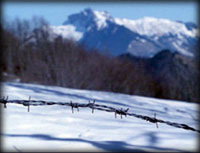
|

|

|

|

|

|

|
(also known as the "Independent Committee
of Eminent Persons")
This Commission was set up in 1996 to conduct an
"investigative audit" of any dormant Swiss bank accounts that may have
been held by Nazi victims, concludes its audit. It is oversaw the work of three international
auditing companies
which probed millions of names in Swiss bank accounts, looking to identify
and recover dormant accounts of victims of Nazi Germany.
The Commission was established by formal agreement between
the Swiss Bankers Association (SBA), the World Jewish Congress and the World
Jewish Restitution Organization. Three of its members are from Jewish
organizations, three from SBA and the chairman is Paul Volcker, former U.S.
Federal Reserve Board chairman. The audits are being paid for by the SBA. In
conjunction with the investigation, the Swiss Parliament passed legislation
which waived the customary Swiss banking secrecy for five years.
In December 1999 the Commission announced it found 54,000 accounts that were probably
linked to Nazi victims. The report was very critical of the actions of individual banks but
stated there was "no evidence of systematic destruction of records of victim accounts"
and no "organized discrimination" against them. However, the Commission found that
the banks showed "a general lack of diligence--even active resistance--in
response to private and official inquiries." The Commission's head, Paul A. Volcker,
said he saw no reason to revise the $1.25 billion settlment that the two largest banks
reached in 1998 with surviving Holocaust victims.
|

|
(the so-called 'Eizenstat Report')
Eleven U.S. government agencies carried out a review of Swiss
conduct during and after the war under the direction of U.S. Undersecretary of
Commerce Stuart Eizenstat. The 'preliminary' report was issued May 1997 and
harshly criticized Switzerland, concluding that its government deliberately
failed to respect a 1946 agreement to return hundreds of millions of dollars in
monetary gold and other assets that Nazi Germany looted from European banks and
Holocaust victims.
The report asserted that Swiss bankers were indifferent to the needs of the
Holocaust vicitms and their heirs until pressured to take actions. It also
faulted the Truman Administration for settling for token reparations from
Switzerland due to pressures to focus on the emerging Soviet threat. The full
text of the Eizenstat Report is available online:
http://www.ushmm.org/index.html)
|

|
Officially called the Independent Commission of Experts, this group was established by the
Swiss Parliament and headed by Jean-Francois Bergier, an economic
historian. Made up of Polish, American, Israeli and Swiss
historians, the Commission's task was to conduct a major review of the entire historical relationship of Switzerland to Nazi Germany.
In December 1999 the Commission issued its conclusions. It stated that Swiss officials during World War II refused entry to thousands of Jewish refugees even after it was known that they faced almost certain death in Nazi Germany. The Commission's historians also said there was no evidence that accepting many more asylum seekers would have put neutral Switzerland in danger of Nazi invasion or "caused insurmountable economic difficulties." The Commission cited anti-Semitism and a deep-seated fear of foreigners in Switzerland as the reasons authorities refused asylum to more than 24,000 Jews.
|

|
This group was created in October 1996 to coordinate
and help with the activities of all the groups and organizations, foreign and
Swiss, investigating lost assets of Nazi victims. It is a 30-member team of
people headed by diplomat Thomas Borer.
|

|
This group will probe
Switzerland's bilateral agreements with Poland, Hungary and other East European
countries. Two Swiss historians are authorized to review accords under which
dormant Swiss bank accounts were turned over to Swiss nationals to settle
claims for nationalized property.
|

|
Senator Alfonse D'Amato has chaired
several hearings on the issue of looted assets held in Switzerland, the first
one held in April of 1996. These hearings spurred the U.S. government to
launch a major U.S. interagency inquiry which produced the May 1997 'Eizenstat
report.'
|

|
It conducted a 1996 inquiry into what
became of gold secreted in Switzerland. Its published findings can be found at
the web site of the British Information Services. The report confirmed that
Germany looted more than $550 million in gold (value at that time) and sent
most of it to Switzerland. Only a small portion was ever returned to Allied
governments..
|

|
It has started an investigation of the
accord with Switzerland whereby Switzerland gave Poland inheritance rights to
assets held in Switzerland belonging to Polish citizens. (Switzerland had a
similar accord with Hungary.)
|

|
Sweden, Spain, Portugal, France, Norway the Netherlands, Belgium, Brazil
and Argentina have created historical commissions to
investigate the issue of assets looted by Nazi Germany.
|

|
The Eizenstat report of May 1997 said the United States would
explore the idea of an international conference on the flow of Nazi assets
after the war and said it would be important to have German Reichsbank records
available for tracing records. Britain's new Labor government offered in May
1997 to host such a conference, and Switzerland welcomed the idea.
Three class action lawsuits have been brought against Switzerland's
banks on behalf of Holocaust victims and their heirs. In March 1997 a Brooklyn
Federal judge ruled that the lawsuits be consolidated and they will be
administered by a 10-member executive committee. There are thousands of
plaintiffs in these lawsuits seeking damages in the billions of dollars.
(For more about these lawsuits, see the "Seeking Wartime Bank Accounts" section of this Web site)
|
| home . reactions . the train . neutral or afraid? . readings . seeking wartime bank accounts . map . chronology . status of the investigations . tapes & transcripts . press explore FRONTLINE . pbs online
web site copyright WGBH educational foundation

|